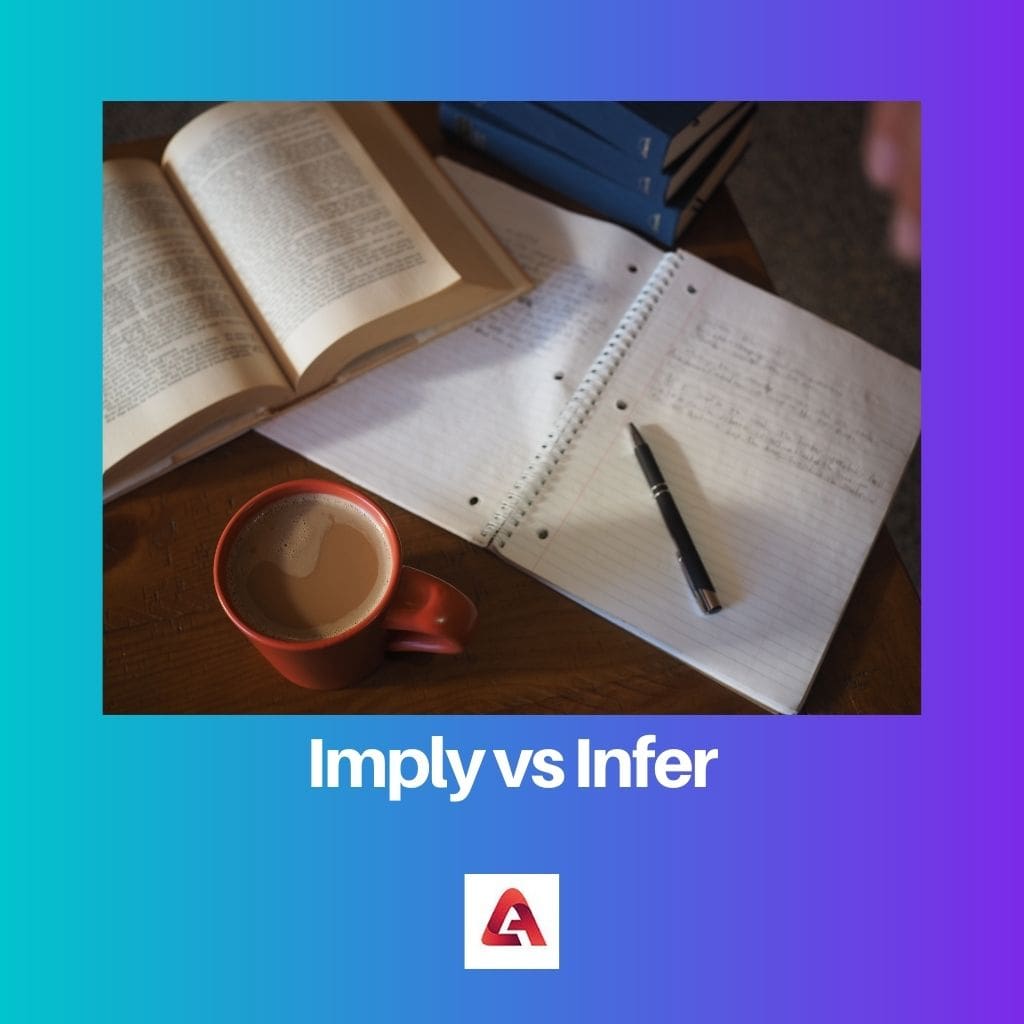“Imply” is used by a speaker or writer to suggest or express something without explicitly stating it. Example: “His silence implied disagreement.” On the other hand, “infer” is the act of deducing or understanding information based on clues or implications. Example: “She inferred his displeasure from his frowning expression.” In essence, one implies, while the other infers.
Key Takeaways
- To imply is to suggest or indicate something indirectly through words, actions, or statements.
- To infer is to deduce or draw a conclusion based on available information, even if not explicitly stated.
- Communication involves implying and inferring, with the sender implying a message and the receiver interpreting or inferring its meaning.
Imply vs Infer
The difference between Infer and Imply is that Infer is concerned with receiving the information implicit in a statement or a gesture. Imply is concerned with indirectly conveying something through a word or a gesture. It is the speaker who does the task of implying. While inferring is the task of the listener.

The meaning of ‘Imply’ is to refer to something implicitly rather than explicitly. It is also used to describe something as the logical outcome of a particular fact or an event. For example:
- She didn’t imply anything wrong when she said that.
- The forecast of the cyclone indicated the destruction of lives and properties.
‘Infer’, on the other hand, means to conclude something from the provided information and evidence rather than from direct and clear-cut statements. To infer something, one needs to read between the lines.
Comparison Table
| Feature | Imply | Infer |
|---|---|---|
| Meaning | To suggest or hint at something indirectly | To draw a conclusion based on evidence or reasoning |
| Action | Done by the speaker, writer, or source of information | Done by the listener, reader, or interpreter of information |
| Direction of Communication | Conveying a message with an underlying meaning | Understanding a message and reaching a conclusion |
| Strength of Suggestion | Can be vague or open to interpretation | Conclusion can be strong or weak depending on evidence |
| Example | “She said it was ‘nice’ weather today, implying she wanted to go for a walk.” | “From the muddy paw prints, I inferred the dog had been outside in the rain.” |
What is meant by Imply?
Imply, in the context of logic and mathematics, refers to a logical relationship between two statements where the truth of one statement guarantees the truth of another. It is denoted by the symbol “→” or “⇒,” and it signifies a connection between a premise (antecedent) and a conclusion (consequent). Understanding implication is crucial in various fields, including logic, mathematics, philosophy, and computer science.
Types of Implication
1. Material Implication
- Definition: Material implication is the most common form of implication used in classical logic. It states that the implication “p → q” is false only when “p” is true and “q” is false; otherwise, it is considered true.
- Symbolic Representation: p→q
2. Logical Implication
- Definition: Logical implication is a broader concept that encompasses various logical systems and their specific rules for implication. Different logical systems may have distinct rules governing the relationship between statements.
- Symbolic Representation: p⇒q
Truth Table
A truth table is often employed to illustrate the possible truth values of the antecedent and consequent in different scenarios. For material implication (p→q), the truth table is as follows:
| p | q | p→q |
|---|---|---|
| T | T | T |
| T | F | F |
| F | T | T |
| F | F | T |
This table outlines the conditions under which the implication is considered true or false based on the truth values of the individual statements.
Practical Examples
To grasp the concept of implication better, consider real-world examples:
- Example 1: “If it is raining (p), then the ground is wet (q).”
- In this case, the implication is true, as rain (p) implies a wet ground (q).
- Example 2: “If an individual is a student (p), then they attend classes (q).”
- Here, the implication holds true, assuming that students indeed attend classes.

What is meant by Infer?
Infer, in a broad sense, refers to the process of deducing or deriving conclusions based on evidence, reasoning, or observations. This term is commonly used in various fields, including logic, science, statistics, and everyday language. The act of inferencing involves drawing logical conclusions from available information, often requiring the use of existing knowledge or patterns.
Inference in Logic
In logic, inference is a fundamental concept. It involves deriving logical consequences from a set of premises. There are different types of logical inference, such as deductive and inductive reasoning. Deductive reasoning aims to guarantee the truth of the conclusion, assuming the truth of the premises. Inductive reasoning, on the other hand, involves making generalizations based on observations, without ensuring absolute certainty.
Statistical Inference
In statistics, inference plays a crucial role in drawing conclusions about populations based on samples. Two main branches of statistical inference are estimation and hypothesis testing. Estimation involves estimating population parameters based on sample data, while hypothesis testing assesses the validity of a statement about a population parameter.
Estimation
Estimation in statistical inference includes point estimation and interval estimation. Point estimation involves using a single value to estimate a population parameter, while interval estimation provides a range within which the parameter is likely to fall, along with a level of confidence.
Hypothesis Testing
Hypothesis testing is a process used to make inferences about a population based on sample data. It involves formulating a null hypothesis and an alternative hypothesis, collecting data, and then determining whether there is enough evidence to reject the null hypothesis in favor of the alternative.
Everyday Language and Inference
In daily communication, people often make inferences to understand implied meanings or to fill in missing information. Conversations and written text may contain implicit messages that require the listener or reader to infer the intended meaning. This aspect of inference is essential for effective communication and comprehension.
Machine Learning and Inferencing
In the context of machine learning, inferencing refers to the process of making predictions or decisions based on a trained model. Machine learning models are trained on data, and once trained, they can infer outcomes for new, unseen data. This application of inferencing is prevalent in various fields, including natural language processing, image recognition, and predictive analytics.

Main Differences Between Imply and Infer
- Imply:
- Refers to suggesting or expressing something indirectly.
- Involves conveying a message without explicitly stating it.
- Operates from the perspective of the communicator.
- Infer:
- Involves deducing or deriving conclusions from evidence or information.
- Requires analyzing data or context to draw logical connections.
- Operates from the perspective of the interpreter or recipient of the communication.
- Relationship:
- Implying precedes inferring; someone implies a message, and someone else infers the intended meaning.
- Implying involves the creation of implicit messages, while inferring involves interpreting those implicit messages.
- Roles:
- Implying typically involves speakers or writers conveying messages indirectly.
- Inferring typically involves listeners or readers interpreting the implied meanings based on available evidence or context.
- Process:
- Implying relies on subtle cues, such as tone, context, or gestures, to convey a message indirectly.
- Inferring requires analyzing these cues to deduce the intended meaning and draw conclusions.

Although the comparisons were accurate, the content seems a bit dry.
I see what the author is trying to convey but the article is lacking a bit of liveliness.
This article is lacking real-life examples to illustrate the concepts.
The author presents the differences with clarity and precision.
The article makes sense, but it might be a bit too verbose.
The article might be helpful for those looking for a detailed examination of these language subtleties.
This article offers a comprehensive explanation about the differences between imply and infer. Good job!
I completely agree with you, Wood Nicole. The article is very well-written and informative.
I found the article to be quite engaging and intellectually stimulating.
The content is well structured and easy to follow. I appreciated it.
I think the article could do a better job at providing examples for clarity.